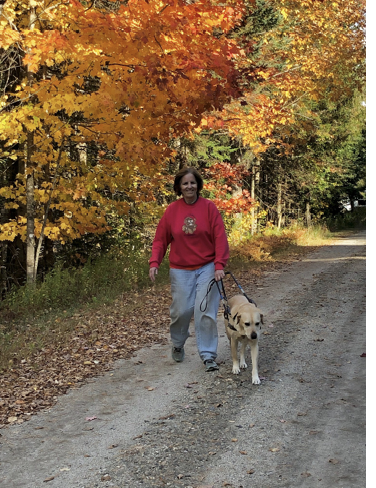Martha Steele

The author with her guide dog Alvin. Photograph by Bob Stymeist.
Walking down our rural road in Vermont on an early autumn day is a far cry from the experience of the exact same walk in the spring. One is a stark reminder of the coming winter with only a handful of resident species to enjoy, whereas the other is an explosion of song and activity unmatched at any other time of the year. Regardless of the season or what I am doing, my sensory antennae are always searching for the presence of birds.
As I write this from the Northeast Kingdom of Vermont in late September, we have had our first frost of the season and the peak foliage is already behind us. Forays outside during autumn are met usually with the sounds of squirrels, rustling leaves and swishing branches set in motion by wind, insects buzzing, or just plain silence. But I still listen, always alert for something that signals a bird is nearby. On this late September day, I will have to be satisfied with Blue Jay, Common Raven, Red-breasted Nuthatch, and Black-capped Chickadee.
Because we have essentially trained ourselves to consciously or subconsciously tune into the sounds and sights of birds, we can be jolted at any moment by the unexpected, even if we think we are not birding. I can sit in my Arlington, Massachusetts, home working on my computer, concentrating on understanding the digital voice from my screen reader program filling the room with its sound. The windows can be closed and birding the furthest thing from my mind. Suddenly, the song of a Mourning Dove penetrates the window and reaches my ears. Everything I am doing grinds to a halt while I let the song wash over me. I smile and listen until the bird moves on.
Yes, on some level, we are always birding. Even during periodic stressful times while dealing with personal or family crises, our deep-rooted attention to all sights and sounds of birds can provide momentary relief or distraction. My mother recently had a stroke just weeks shy of her 96th birthday. After a hospital stay, she entered a local rehabilitation facility in Newport, Vermont, near her home. Due to Covid-19 restrictions, we could only visit through a closed window, with Mother sitting in a chair inside and my husband Bob, my guide dog Alvin, and I standing outside. We were focusing on our conversation with Mother when Bob exclaimed, “A Carolina Wren!” It took a second for me to realize that I had just heard the wren as well. Despite the fact that we were concentrating completely on our visit, made more difficult by having to talk loudly through a window, Bob was still birding, alert to the sounds that birders are always listening for. This particular bird song was notable as it was only the third time that we had heard or seen a Carolina Wren in this part of the world.
You might argue that we are not birding when we sleep. But wait—even that time is not exempt from our birding tendencies. Many summer nights in our Vermont home, Bob has awoken me to tell me that a Barred Owl was calling. He himself was jarred out of his sleep by the who cooks for you calls. When I am asleep, I am completely deaf after removing my cochlear implants for the night. Bob needs to physically shake me awake to let me know that I need to get my implants on and find out what is going on. I stumble out of bed, don the implants, and learn that an owl is calling. We rush out onto the deck off our bedroom, even at three o’clock in the morning, to listen to the owl until it stops. Yes, we even bird in our sleep.
We just never stop birding, be it morning, noon, or night. Even in the most mundane of circumstances and at the least likely time, our senses are still on the lookout for birds. On a warm May night, our group of friends can walk out of a busy restaurant to noisy traffic. We engage in final good nights, well-wishes for each other’s families, and assurances that we will soon meet again. But the birders among us are suddenly distracted; we hear the unmistakable sound of migrating songbirds overhead.
Our friends and families often roll their eyes at our birding stories, but among ourselves, a day without talking or looking for birds is a very rare day indeed. Many times, our enthusiasm for birds eventually rubs off onto others. Especially in this year of Covid-19, with many people able to spend time outside of their physical workplaces, we have found that more people are aware of birds and even beginning to learn to identify the species. We are getting more emails from friends or family alerting us to a news story on birds, as well as more photographs with requests to identify a bird in their yard. It certainly makes us smile. Maybe, just maybe, a few will find a new passion, and they too will learn the joys of the omnipresent nature of birding.
Martha Steele, a former editor of Bird Observer, has been progressively losing vision due to retinitis pigmentosa and is legally blind. Thanks to a cochlear implant, she is now learning to identify birds from their songs and calls. Martha lives with her husband Bob Stymeist, in Arlington. Martha can be reached at marthajs@verizon.net.